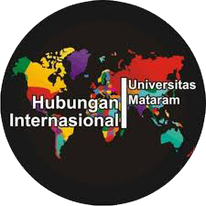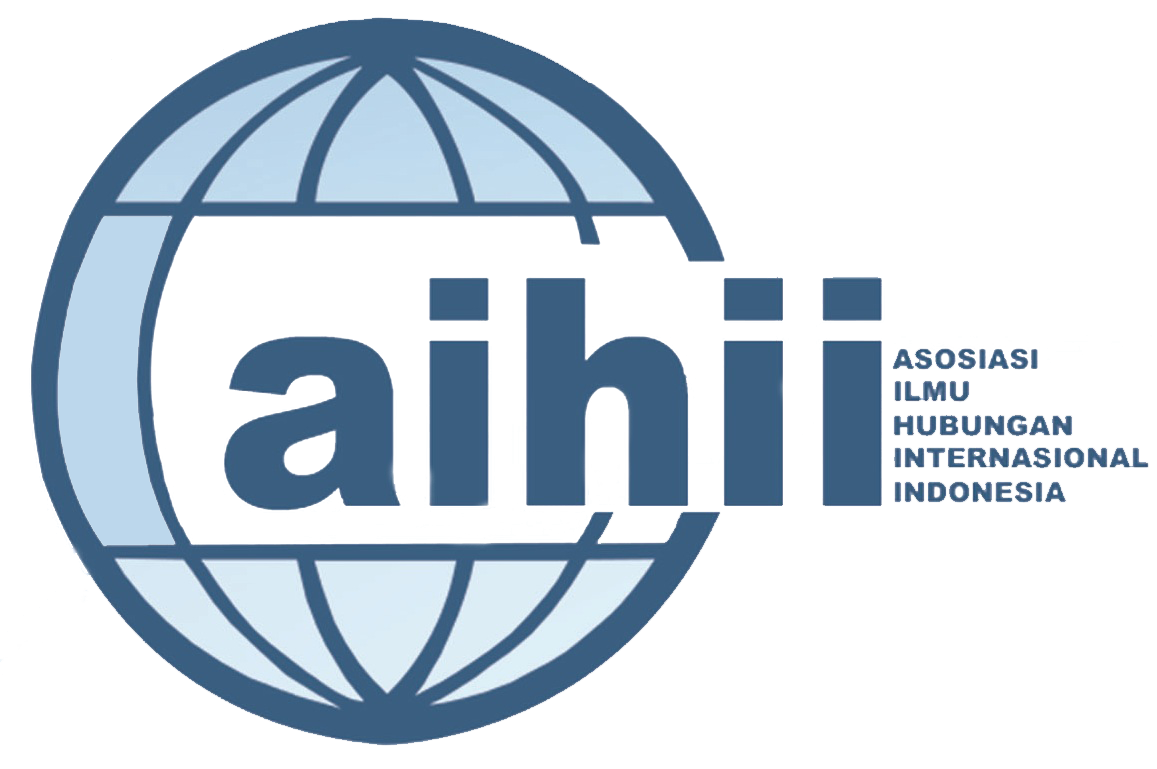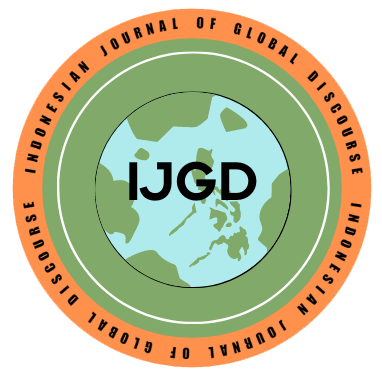Perubahan Kebijakan Pertahanan Turki Mendukung Keanggotaan Finlandia di North Atlantic Treaty Organization (NATO): Perspektif Reputasi
Keywords:
Turkiye, Finland, NATO’s Values and Principles, Reputation, Russian AggressivenessAbstract
The Russia-Ukraine conflict has raised concerns among the Nordic countries bordering Russia such as Finland, Sweden, Denmark, Iceland, and Norway. Russia’s military invasion in Ukraine and its military aggressiveness in the region threatens regional stability and security of the Nordic countries. As one of the Nordic countries, Finland responded to Russian aggressiveness by joining the North Atlantic Treaty Organization (NATO) to counteract Russia’s security threats in the region. Finnish membership in NATO was rejected by Turkiye as one of the NATO membership veto holders. However, Turkiye changed its defence policy by supporting Finnish membership in NATO. This study aims to analyze the role of reputation in influencing Turkiye’s defence policy change to support Finnish membership in NATO. Using an analytical descriptive research method accompanied by Jonathan Mercer’s reputation theory, this study proposes the main argument that Turkiye’s defence policy change in favor of Finnish membership in NATO was influenced by Turkiye’s reputation factor as a reliable NATO strategic ally. Turkiye endeavours to maintain this reputation as NATO allies are skeptical of Turkish commitment to uphold NATO’s values and principles. Turkish support for Finnish membership in NATO confirms Turkish commitment to NATO enlargement in order to create regional stability and security in Europe.
References
Acikmese, S. A., & Triantaphyllou, D. (2012). The NATO-EU-Turkey trilogy: The impact of the Cyprus conundrum. Journal of Southeast European and Black Sea, 12(4). https://doi.org/10.1080/14683857.2012.741846
Alaranta, T. (2022). NATO’s Nordic Enlargement and Turkey’s Reservations: Trilateral Memorandum of Understanding in the Context of Turkey’s Wider Strategic Interests. FIIA Briefing Paper, 349. https://www.fiia.fi/wp-content/uploads/2022/09/bp349_natos-nordic-enlargement-and-turkeys-reservations.pdf
Arter, D. (1996). Finland: From neutrality to NATO? European Security, 5(4). https://doi.org/10.1080/09662839608407292
Arter, D. (2023). From Finlandisation and post-Finlandisation to the end of Finlandisation? Finland’s road to a NATO application. European Security, 32(2), 171–189. https://doi.org/10.1080/09662839.2022.2113062
Ashford, E., & Kroenig, M. (n.d.). Is Erdogan’s Turkey Weakening NATO? Retrieved July 11, 2023, from https://foreignpolicy.com/2023/01/13/turkey-erdogan-nato-crucial-corrosive-ally/
Atrashkevich, A. N., & Panarin, S. A. (2022). How Conflicts between Greece and Turkey in the 19th – Early 20th Centuries Affected the Formation of Historical Memory in Both States. Vostok (Oriens), 2022(1), 184–195. https://doi.org/10.31857/S086919080018177-1
Averre, D. (1998). NATO expansion and Russian national interests. European Security, 7(1). https://doi.org/10.1080/09662839808407348
Bandow, D. (n.d.). Why Is Turkey Still in NATO? | Cato Institute. Retrieved July 11, 2023, from https://www.cato.org/commentary/why-turkey-still-nato
Bayer, L. (n.d.-a). Turkey, Hungary to approve Finland’s NATO membership – POLITICO. Retrieved July 11, 2023, from https://www.politico.eu/article/turkey-approve-finland-nato-membership-sweden-edrogan/
Bayer, L. (n.d.-b). Turkey is the headache NATO needs – POLITICO. Retrieved July 16, 2023, from https://www.politico.eu/article/turkey-nato-sweden-finland-is-the-headache-nato-needs/
Bölme, S. M. (2022). NATO-Türkiye Relations: From Irreplaceable Partner to Questionable Ally. Studia Europejskie - Studies in European Affairs, 93–116. https://doi.org/10.33067/se.3.2022.5
Bongiovanni, F. M. (2018). Turkey: the Nato Alliance’S Wild Card. Turkish Policy Quarterly, 17(2), 53–62.
Cagaptay, S. (n.d.). For NATO, Turkey Is a Disruptive Ally - The New York Times. Retrieved July 11, 2023, from https://www.nytimes.com/2022/05/30/us/politics/turkey-nato-russia.html
Cagaptay, S., Singh, M., & Akgundogdu, S. (n.d.). Will Turkey Ratify Sweden and Finland’s NATO Accession? | The Washington Institute. Retrieved July 16, 2023, from https://www.washingtoninstitute.org/policy-analysis/will-turkey-ratify-sweden-and-finlands-nato-accession
Caman, M. E. (2021). Authoritarianization and Human Rights in Turkey: How the AKP Legitimizes Human Rights Violations. In Philosophy and Politics - Critical Explorations (Vol. 15, pp. 179–197). Springer Science and Business Media B.V. https://doi.org/10.1007/978-3-030-57476-5_9
Copeland, D. C. (1997). Do reputations matter? Security Studies, 7(1), 33–71. https://doi.org/10.1080/09636419708429333
Cordesman, A. H. (2019). Turkey and NATO. Strategic Comments, 25(9), x–xii. https://doi.org/10.1080/13567888.2019.1703305
Coskun, A. (n.d.). Sweden’s NATO Problem Is Also Turkey’s NATO Problem - Carnegie Endowment for International Peace. Retrieved July 16, 2023, from https://carnegieendowment.org/2023/02/01/sweden-s-nato-problem-is-also-turkey-s-nato-problem-pub-88929
Creswell, J. W., & Creswell, J. D. (2022). Research Design: Qualitative, Quantitative, and Mixed Methods Approaches (6th ed.). SAGE Publications.
Detsch, J. (n.d.). Turkey Looks for Pound of Flesh at NATO Summit, Putting Sweden’s and Finland’s Bids on the Line. Retrieved July 16, 2023, from https://foreignpolicy.com/2022/06/27/turkey-erdogan-nato-summit-sweden-finland-russia/
Eichler, J. (2021). NATO After the End of the Cold War. Vojenské Rozhledy, 30(2), 003–025. https://doi.org/10.3849/2336-2995.30.2021.02.003-025
Ene, A. M. (2018). The Role of Turkey in the Perspective of Nato ’ s Extension Policies in South - Estern Europe. Acta Universitatis Danubius Relationes Internationales (AUDRI), 11(1), 172–178. https://doi.org/https://journals.univ-danubius.ro/index.php/internationalis/article/download/5158/4603
Erdogan, B. (2022). Investigating Turkey’s Changing Narratives Regarding Interventions in Libya and Syria. European Review of International Studies, 9(3), 389–430. https://doi.org/10.1163/21967415-09030003
Erdurmaz, P. D. A. S. (2019). Should Turkey Excluded from NATO or She Should Quit it İtself. Global Journal of Human-Social Science, 63–78. https://doi.org/10.34257/gjhssevol19is8pg63
Erkoyun, E., & Ozkan, M. (n.d.). Turkish parliament ratifies Finland’s NATO accession as Sweden kept waiting | Reuters. Retrieved July 16, 2023, from https://www.reuters.com/world/europe/turkish-parliament-approves-finlands-nato-accession-2023-03-30/
Forsberg, T., & Vaahtoranta, T. (2001). Inside the EU, outside NATO: Paradoxes of Finland’s and Sweden’s post‐neutrality. European Security, 10(1). https://doi.org/10.1080/09662830108407483
Forster, A., & Wallace, W. (2001). What is nato for? In Survival (Vol. 43, Issue 4). https://doi.org/10.1080/00396330112331343155
Gardner, F. (n.d.). Turkey approves Finland Nato membership bid - BBC News. Retrieved July 16, 2023, from https://www.bbc.com/news/world-europe-65132527
Grigoriadis, I. N. (2022). Between escalation and détente: Greek-Turkish relations in the aftermath of the Eastern Mediterranean crisis. Turkish Studies, 23(5), 802–820. https://doi.org/10.1080/14683849.2022.2087509
Gunter, M. (2022). Some Implications of Sweden and Finland Joining NATO. The Commentaries, 2(1), 91–100. https://doi.org/10.33182/tc.v2i1.2710
Hernandez, G. I. R. (n.d.). Turkey, Hungary Ratify Finland’s NATO Bid | Arms Control Association. Retrieved July 15, 2023, from https://www.armscontrol.org/act/2023-04/news-briefs/turkey-hungary-ratify-finlands-nato-bid
Isachenko, D. (2020). Turkey–Russia Partnership in the War over Nagorno-Karabakh. SWP Comment, 53. https://www.swp-berlin.org/10.18449/2020C53/
Jamilah, M., Yonanda, C., Harza, Z., & Masri, I. S. (2020). Factors Supporting Turkey’s Policy to Purchase Russian S-400 Anti-Air Strike Defense Units. Journal of Strategic and Global Studies, 3(1). https://doi.org/10.7454/jsgs.v3i1.1026
Kalkan, E. (2020). The Longstanding Dispute between Turkey and Greece: The Aegean Issue. Uluslararası İktisadi ve İdari İncelemeler Dergisi, 28, 167–174. https://doi.org/10.18092/ulikidince.713136
Kara, M. (2023). Turkish-American strategic partnership: is Turkey still a faithful ally? Journal of Southeast European and Black Sea, 23(2). https://doi.org/10.1080/14683857.2022.2088081
Karaosmanoglu, A. L. (1999). NATO Enlargement and the South: A Turkish Perspective. Security Dialogue, 30(2), 213–224. https://doi.org/https://doi.org/10.1177/0967010699030002008
Kayali, L. (n.d.). Sorry Russia, the Baltic Sea is NATO’s lake now – POLITICO. Retrieved July 16, 2023, from https://www.politico.eu/article/nato-lake-what-sweden-and-finland-will-change-in-the-baltics-russia-ukraine-war/
Kinacioǧlu, M., & Gürzel, A. G. (2013). Turkey’s contribution to NATO’s role in post-Cold war security governance: The use of force and security identity formation. Global Governance, 19(4), 589–610. https://doi.org/10.1163/19426720-01904007
Köse, İ. (2015). Challenges to nato’s fifth enlargement round: Turkey’s attitude towards romania’s admission. Codrul Cosminului, 21(2), 299–312.
Marten, K. (2018). Reconsidering NATO expansion: A counterfactual analysis of Russia and the West in the 1990s. In European Journal of International Security (Vol. 3, Issue 2, pp. 135–161). Cambridge University Press. https://doi.org/10.1017/eis.2017.16
Mercer, J. (1996). Reputation and International Politics. Cornell University Press.
Mercer, J. (1997). Reputation and rational deterrence theory. Security Studies, 7(1), 100–113. https://doi.org/10.1080/09636419708429335
Miles, M. B., Huberman, A. M., & Saldana, J. (2014). Qualitative Data Analysis: A Methods Sourcebook (3rd ed.). SAGE Publications.
Mitchell, A. W. (n.d.). NATO: Keep Urging Turkey to Admit Sweden, Finland as Allies | United States Institute of Peace. Retrieved July 16, 2023, from https://www.usip.org/publications/2023/02/nato-keep-urging-turkey-admit-sweden-finland-allies
Mousseau, D. Y., Napolitano, J., & Olsen, A. (2019). Introducing the Human Rights Violations Dataset for the Kurdish Conflict in Turkey, 1990-2018. Peace Economics, Peace Science and Public Policy, 25(4). https://doi.org/10.1515/peps-2019-0036
Neset, S. (2023). What Turkey Wants: Turkey’s Objection to Finland and Sweden’s NATO Membership Applications. IFS Insights, 3, 2–3. https://www.forsvaret.no/forskning/fou-formidling-ved-forsvarets-hogskole/IFS Insight 3 2023 Turkey.pdf/_/attachment/inline/25a3440c-8e39-4114-90eb-6690f0e161fc:477749fe9fe83270ffd7d962c4a26e383ab5fa41/IFS Insight 3 2023 Turkey.pdf
Nikolin, B. (1998). NATO’s Eastward Expansion. Russian Politics & Law, 36(4), 39–49. https://doi.org/10.2753/rup1061-1940360439
Nokkala, A. (2023). It Is About Protection. Defence in Finland’s Steps to NATO. Studia Europejskie - Studies in European Affairs, 26(4), 39–72. https://doi.org/10.33067/se.4.2022.2
Oǧuzlu, T. (2012a). Turkey’s eroding commitment to NATO: From identity to interests. Washington Quarterly, 35(3), 153–164. https://doi.org/10.1080/0163660X.2012.706578
Oǧuzlu, T. (2012b). Turkey and NATO: An ambivalent Ally in a changing Alliance. Uluslararasi Iliskiler, 9(34), 99–124.
Oztig, L. I. (2020). The Turkish–Greek Border Crisis and COVID-19. Borders in Globalization Review, 2(1), 78–81. https://doi.org/10.18357/bigr21202019843
Robinson, K. (n.d.). Turkey’s Growing Foreign Policy Ambitions | Council on Foreign Relations. Retrieved July 16, 2023, from https://www.cfr.org/backgrounder/turkeys-growing-foreign-policy-ambitions
Rogozińska, A. (2020). The role of NATO in shaping the global security system. Reflections on the 70th anniversary of the founding of the organization. Belügyi Szemle, 68(1. ksz.). https://doi.org/10.38146/bsz.spec.2020.1.3
Seufert, G. (2020). Turkey Shifts the Focus of Its Foreign Policy: From Syria to the Eastern Mediterranean and Libya. SWP Comment, 6, 1–4. www.ssoar.info
Soekarba, S. R., Ayona, D., & Shavira, C. J. (2019). Stabilizing or Destabilizing? Reconsidering the Relevance of Turkey’s NATO Membership. International Review of Humanities Studies, 4(1). https://doi.org/10.7454/irhs.v4i1.137
Starr, H., & Siverson, R. M. (1990). Alliances and geopolitics. Political Geography Quarterly, 9(3), 232–248. https://doi.org/10.1016/0260-9827(90)90025-6
Suleymanov, A. V. (2019). Cyprus problem: History and present. World Economy and International Relations, 63(2), 75–84. https://doi.org/10.20542/0131-2227-2019-63-2-75-84
Temko, N. (n.d.). Turkey in NATO: Inscrutable, unreliable, but indispensable - CSMonitor.com. Retrieved July 11, 2023, from https://www.csmonitor.com/World/2023/0202/Turkey-in-NATO-Inscrutable-unreliable-but-indispensable
Tuncer, A. M. (2022). Turkey’s Options for Finland and Sweden’s NATO Membership Applications. International Journal of Science and Research, 11(5), 1579–1582. www.nato.
Yackley, A. J., & Milne, R. (n.d.). Turkey drops opposition to Finland’s bid to join Nato | Financial Times. Retrieved July 11, 2023, from https://www.ft.com/content/0e6be021-6471-4b30-ba72-33fc9fa6ccd5
Yilmaz, Ş. (2012). Turkey’s quest for NATO membership: The institutionalization of the Turkish-American alliance. Journal of Southeast European and Black Sea, 12(4). https://doi.org/10.1080/14683857.2012.741844
Published
Issue
Section
Copyright (c) 2023 Sirwan Yazid Bustami

This work is licensed under a Creative Commons Attribution-NonCommercial 4.0 International License.













